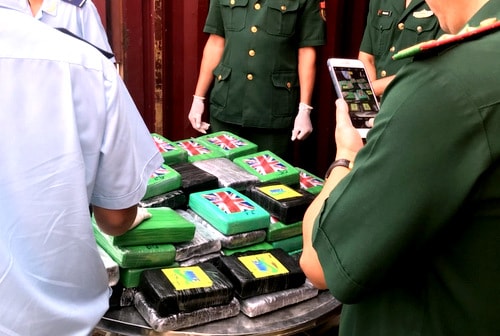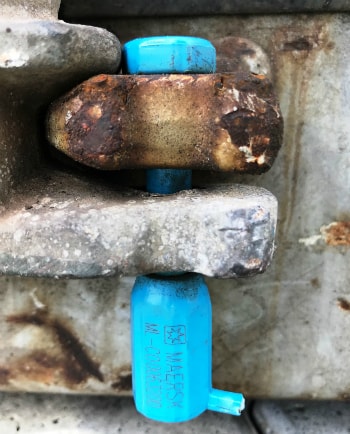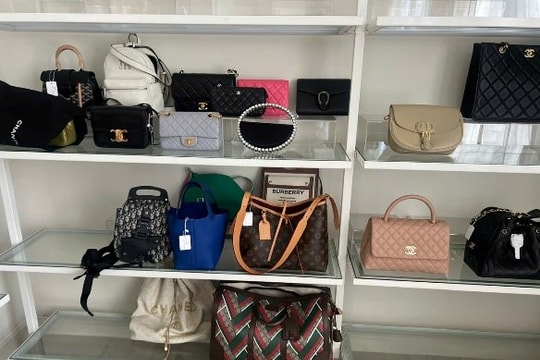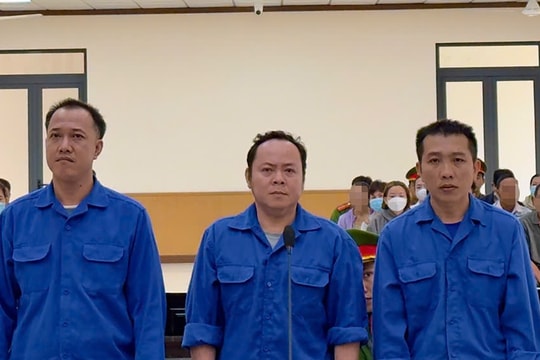What do the businesses involved in the 100 cocaine cakes case say?
The 100 bricks of cocaine seized by authorities were in a container sent to Pomina by Singapore-based Stamcorp International Pte Ltd.
Checking a shipment of scrap imported to Cai Mep - Thi Vai port (Phu My town), the Customs Department of Ba Ria - Vung Tau province discovered 100 bars of cocaine contained in a container of a shipment of 17 scrap containers sent by Singapore-based Stamcorp International Pte Ltd to Pomina Steel Joint Stock Company. This shipment was transported by the ship Mark Shenzhen (Liberian nationality) and had docked at many different ports around the world before arriving in Vietnam.
Speaking to reporters, a representative of Stamcorp International Pte Ltd said that the contract with Pomina was signed on April 5. After the contract was completed, the company began to ship goods to customers. During the shipping and packing process, representatives of the company, authorities and shipping lines witnessed the packing process. The 17 shipments were sealed (lead sealed) by the shipping line in accordance with international regulations. The number of seals on each container will be written by the company in the bill of lading and sent to the shipper and consignee.
|
100 cocaine cakes were seized at Vung Tau port. Photo:Ha Truong. |
When the ship arrived in Vietnam, the authorities inspected the shipment. Of the 17 containers, 16 had the same seal number on the bill of lading sent by the shipping company. Only one shipment had a different seal and code (ML-CO 0063200). This seal code was also different from the code on the receipt (PAO245388) in the Maersk Line arrival notice. In fact, international standard seals are very difficult to counterfeit. This seal can only be used once. Therefore, once the seal is cut, it is difficult to re-lock, so the seal may have been cut to switch the goods and used another seal to lock.
"WhenWe received notice that the container contained prohibited goods.also surprised because do not know where the cause comes from. CaseIf the shipment does not match the original seal and bill of lading, the shipping company will be responsible for the shipment. Currently, the company is still coordinating with Vietnamese authorities to investigate, so we have not yet filed a complaint with the shipping company. However, we will respond to them when Vietnamese authorities allow it," said a representative of the above company.
Also denying the trade of banned goods, Mr. Do Xuan Chieu - Chairman of the Board of Directors of Pomina Steel said that the incident not only affects the company's brand but also the entire steel industry.
Mr. Chieu also confirmed that in 17 containers, there was one batch with a seal code that was completely different from the number on the bill of lading, even though the code on the container was correct. When the goods arrived at the port, the company had not yet received the goods but was only waiting for customs clearance. According to regulations, if the goods do not match the bill of lading number, the business will not receive the goods. The company can only receive the goods and pay when the bill of lading code on the shipment matches the invoice provided by the owner in Singapore.
|
The seal on the container containing 100 cocaine cakes has a different number than the seal on the bill of lading that the shipping company notified the consignee and shipper. Photo:Pomina. |
According to Mr. Chieu, the above shipment carried 355 tons of goods, each container weighed more than 20 tons, with a total value of more than 3 billion VND. During the inspection, the shipment containing prohibited goods was discovered from the beginning because they had many different characteristics in terms of seals and bill of lading codes. Currently, the goods are still being held by the authorities for investigation. The company is also working with the authorities to clarify this issue.
Regarding the shipping company, PV continuously contacted the representative in Vietnam but the company still refused to respond and said it was waiting for notification from the parent company.
Regarding the authorities, Ba Ria - Vung Tau Province Customs said that they have reported the incident to the General Department and are coordinating with the police and relevant parties to investigate and clarify the above shipment, so they cannot give a specific answer yet.
Commenting on the above incident, the director of a transport company in Ho Chi Minh City said that according to transport regulations, when goods are packed and sealed with a seal with a certain serial number, when the goods arrive at the destination, if the seal is intact and matches the bill of lading, the carrier is considered to have fulfilled its legal responsibility. However, with the above shipment, suddenly there is a seal that does not match the bill of lading, the serial number is completely different, the transport unit must take responsibility and give reasonable reasons to explain to the owner.
This person added that during the transportation process, if the shipping company encounters any problems that cause the old seal to come off or lose, it must notify the shipper. On the other hand, when the goods arrive, the receiving port will have to reconfirm with the shipping company and the sender about the new seal number. When the parties agree and give a convincing reason, and the goods meet the requirements, then the recipient will receive the goods.
According to this expert, with a shipment containing 100 cocaine bars from America, transiting through two other ports before arriving in Vietnam. Therefore, during this journey, the goods can be inspected at any port. However, normally, for transit goods, customs mostly rely on documents and certificates as well as the reputation of the business to clear customs, so they rarely check directly. Only when there is suspicion will they cut the seal to check, and then the customs agency will also notify the parties and issue a new seal. In this case, to know which unit cut the seal and switched the goods, it is necessary to find out from the packing stage, the relationships on the ship to the ship's stops. On July 24, at the port
At Cai Mep - Thi Vai port, customs seized 100 bricks of cocaine contained in a 355-ton steel shipment imported by Pomina. After checking the itinerary, customs said that the shipment was transported by Mark Shenzhen (Liberian nationality) captained by Mr. Vernygora (Ukrainian nationality) leaving Trinidad and Tobago (America) two months ago. The ship then docked at Panama port and stayed for nearly half a month before departing for China on July 15. Nine days later, the ship docked at Tan Cang Cai Mep - Thi Vai port to deliver a shipment of 17 containers of scrap steel from Stamcorp International PTE LTD (Singapore) to the recipient, Pomina 2 Steel Joint Stock Company (located in Phu My town). On the same afternoon, Ba Ria - Vung Tau Customs, when analyzing the cargo declaration, related documents and electronic customs clearance for imported and exported ships, found suspicious signs and proceeded to inspect the container. Mixed in a container filled with scrap steel, four large sacks containing black bags contained 100 colorfully wrapped cakes weighing 119 kg. A quick inspection of the white powder inside the cakes determined it was cocaine, of higher quality than heroin. These 100 cakes of cocaine are worth 700-800 billion VND. According to the leader of Ba Ria - Vung Tau Provincial Police, this is the largest drug discovery ever in the area. |






